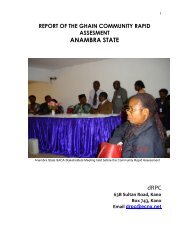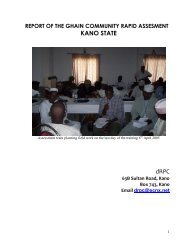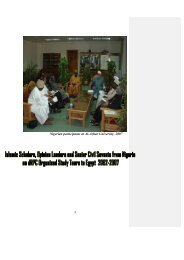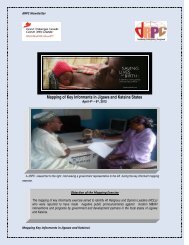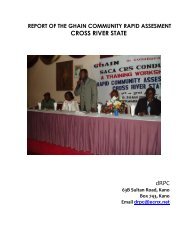Gate - the The development Research and Projects Centre (dRPC)
Gate - the The development Research and Projects Centre (dRPC)
Gate - the The development Research and Projects Centre (dRPC)
You also want an ePaper? Increase the reach of your titles
YUMPU automatically turns print PDFs into web optimized ePapers that Google loves.
Key informant interviewing<br />
Interviewing of persons in NGOs, government agencies <strong>and</strong> o<strong>the</strong>r organizations is <strong>the</strong> second<br />
keystone of <strong>the</strong> community assessment strategy. Our training emphasized techniques of open-ended<br />
interviewing, to get concrete descriptive materials about <strong>the</strong> activities of each organization, <strong>the</strong>ir<br />
collaboration with o<strong>the</strong>r NGOs <strong>and</strong> government agencies, problems encountered by HIV/AIDS<br />
programs, <strong>and</strong> o<strong>the</strong>r information. In order to be sure that certain main points were covered in each<br />
interview, <strong>the</strong> team developed checklists of key information, which were consulted during <strong>the</strong><br />
interviews, although <strong>the</strong>y did not use <strong>the</strong> checklists directly as "interview protocols." Very often <strong>the</strong><br />
interviews uncovered new, unexpected information about <strong>the</strong> organizations, <strong>the</strong>ir attitudes about <strong>the</strong><br />
HIV/AIDS issues, <strong>and</strong> <strong>the</strong>ir contacts with <strong>the</strong> populations <strong>and</strong> places with concentrations of high<br />
risk behaviors.<br />
Careful documentation through note-taking was particularly stressed. <strong>The</strong> team participants were<br />
urged to exp<strong>and</strong> <strong>the</strong>ir notes as soon as possible after each contact in <strong>the</strong> field. <strong>The</strong>y quickly found<br />
that writing out extensive notes on <strong>the</strong> computers is a very time-consuming process. At <strong>the</strong> same<br />
time, <strong>the</strong> extensive note-taking provides our main source of necessary descriptive data for<br />
underst<strong>and</strong>ing <strong>the</strong> activities <strong>and</strong> structures of organizations involved in <strong>the</strong> HIV/AIDS campaign.<br />
Free listing <strong>and</strong> rating techniques<br />
One of our first activities in <strong>the</strong> community assessment process was to collect lists from our team of<br />
all <strong>the</strong> organizations <strong>the</strong>y could think of that are involved in HIV/AIDS programs in this part of<br />
Nigeria. Collection of such lists produces a quick preliminary inventory of <strong>the</strong> relevant<br />
organizations, <strong>and</strong> also results in a rough measure of "salience," in <strong>the</strong> form of <strong>the</strong> frequency of<br />
mention of individual organizations. Thus, those NGOs <strong>and</strong> governmental units that are mentioned<br />
by a large percentage of <strong>the</strong> informants can be regarded as more salient, or "better known," in <strong>the</strong><br />
HIV campaign. Such lists should be collected in each of <strong>the</strong> selected states (<strong>and</strong> sub-areas of states),<br />
from local key informants.<br />
Near <strong>the</strong> end of our assessment activities we collected ratings from <strong>the</strong> team members, in which<br />
<strong>the</strong>y were asked to indicate which organizations <strong>the</strong>y believed to be <strong>the</strong> "most effective" in <strong>the</strong><br />
HIV/AIDS campaign. Ideally such ratings would be collected from key informants out in <strong>the</strong><br />
6



